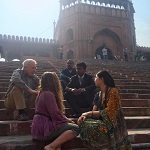Future Generations first began tackling humanity’s toughest challenges in 1992: understanding how to create community-driven change that is both sustainable and scalable. Recognizing traditional approaches to community development were not working, UNICEF launched a task force and enlisted Future Generations to study this question around-the-world. Future Generations was founded to promote the newly synthesized method for community-based sustainable development.
After a decade of successful demonstrations of the methodology advancing health, peacebuilding, conservation, education, and livelihoods across India, Afghanistan, China, Peru and other nations, Future Generations formed a new global learning community to extend this method at scale. A separate graduate school was established in 2006, which today advances research, learning, and action in 42 countries as Future Generations University (Formerly Future Generations Graduate School). The original civil society organization, Future Generations Inc., continues to serve as a connector and resource hub between country programs and the university’s growing alumni in the Future Generations Global Network.
As this learning organization evolved into a University with new research initiatives and a wider reach, so did its innovative approach to global education. What sets all Future Generations programs apart is how they transform the community into the classroom. Life-useful learning is delivered over long distances through a combination of online coursework, peer learning, and community-based projects. The University offers a range of learning opportunities, including online resources, customized training, certificate programs, and a Master of Arts in Applied Community Development. This degree program is accredited by the Higher Learning Commission, the USA’s oldest and largest higher education accrediting body.


